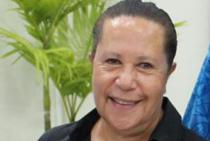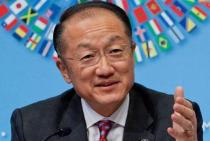A key challenge for the Forum is to maintain its solidarity as staunchly pro-Blue Pacific...where we are custodians of some of the world’s richest biodiversity and marine and terrestrial resources. Leaders have articulated a desire for a shift in the development trajectory for the Pacific, through the Blue Pacific narrative and through it the opportunity to exercise our will. This is the strategic lens through which any conversation over China, and the associated geopolitical and geostrategic environment we find ourselves in, must occur. Our political conversations and settlements must be driven by the well-being of our Blue Pacific continent and its people, not by the goals and ambitions of others. By Dame Meg Taylor.
You are here
Results for Op-Ed Global Development
Tuesday 19 February 2019
Port Vila, Vanuatu
Thursday 27 December 2018
London, United Kingdom
Seven decades after its adoption, the Universal Declaration of Human Rights (UDHR) remains a beacon of hope for the world, sending out an unequivocal message that an injustice anywhere is a threat to justice everywhere, and that no abuse of human rights can be allowed to continue without challenge. But despite major advances over the last seven decades – such as the creation of the International Criminal Court (ICC) and the UN’s Responsibility to Protect doctrine – human-rights abuses continue to be perpetrated at an alarming rate and with virtual impunity. By Gordon Brown.
Tuesday 20 November 2018
Paris, France
Eradicating hunger, ending food insecurity, and ensuring sustainability are global priorities that call for collective action. We need to strengthen, not weaken, international cooperation. The international community needs to do three things to harness the benefits of trade in food and agriculture products. By Angel Gurría and José Graziano da Silva
Wednesday 15 August 2018
Paris, France
These are hard times for international cooperation. With rising protectionism, burgeoning trade disputes, and a troubling lack of concern for shared interests like climate change, the world seems to be turning its back on multilateralism. In an era when the benefits of multilateralism are being questioned precisely as we draw closer to the planet’s ecological limits, income inequality is growing, and innovation and technology are transforming how people learn and work, the world needs a more equitable and cooperative approach to globalization. And one of the best ways to deliver it is with a sustainable development model that leaves no one behind. By Alicia Bárcena Ibarra, Stefano Manservisi, and Mario Pezzini.
Tuesday 14 August 2018
Melbourne, Australia
A group of leading economists recently criticized aid to the poor for failing to address poverty's root causes. But while we wait for politicians to act – and it could be a long wait – it is important to concentrate our spare resources on effective aid that helps poor people lead the best lives they can. By Peter Singer.
Friday 18 May 2018
Washington D.C., U.S.A
As we work with partners to tackle the interconnected global challenges of climate change, conflict, famine, and pandemics, we must help countries prepare their people for a more complex, disruptive, digital future. The most important investments countries can make are ones that build human capital—to prepare for that future, and to write the next chapter in the ongoing project of human solidarity. By Jim Yong Kim.
Tuesday 21 November 2017
Brighton, United Kingdom
Despite the clear evidence linking poverty to psychological distress, policies tackling poverty do not typically take shame into account. ... Being poor is a highly shameful experience, degrading one’s dignity and sense of self-worth. While the manifestations and causes of poverty differ, the humiliation that accompanies it is universal. Recent research conducted at the University of Oxford found that from China to the United Kingdom, people facing economic hardship – even children – experience a nearly identical assault on their pride and self-esteem.
Sunday 30 July 2017
New York, USA
Giving girls the skills and knowledge they need to become productive individuals who can participate in the twenty-first-century economy empowers them in all aspects of their lives, enabling them to contribute to their families, communities, and economies in ways they choose. It is the right thing to do for global development – and for girls and women themselves. But ... empowering girls to use their energies and talents to transform their societies will not be easy. By Thoai Ngo.
Wednesday 26 July 2017
1 comment
Stanford, USA
When a tortoise is sitting on a post, you know it didn’t get there by itself. The reappearance of the same four arguments developed a quarter-century ago by an industry that benefits from delaying climate policies – arguments used with great success precisely because their origin and true purpose were hidden from the public – looks a lot like the tortoise’s four wiggling feet. The same arguments – and people – used by the fossil fuel industry to block climate policies decades ago are back. By Benjamin Franta.
Monday 17 July 2017
Princeton, USA
When Americans are asked what percentage of US government spending goes to foreign aid, the median answer is 25%. The correct answer is 1%. No wonder, then, that when President Donald Trump justifies cutting aid on the grounds that other countries need to step up because they are not paying their fair share, many people believe him. By Peter Singer.
Thursday 4 May 2017
1 comment
Nuku'alofa, Tonga
Tonga has numerous vibrant national resources that are fast asleep when they should be generating revenues and driving enterprise. Looking at the trade development of the small Pacific island countries one wonders whether Fiji is one of those that became birds, while Tonga remains among those still crawling.













